Inspector Joseph French is a fictional British police detective created by Irish author Freeman Wills Crofts. French was a prominent detective from the Golden Age of Detective Fiction, appearing in twenty-nine novels and a number of short stories between 1924 and 1957. The character was introduced in the 1924 novel Inspector French's Greatest Case, where he investigates a fatal diamond robbery in Hatton Garden. The series relied largely on puzzle mysteries.
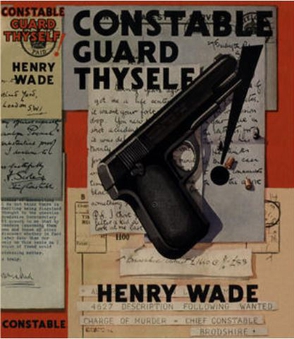
Constable Guard Thyself is a 1934 mystery detective novel by the British writer Henry Wade. It was the third in a series of seven novels featuring the character of Chief Inspector Poole, although it was preceded by the 1933 short story collection Policeman's Lot in which seven of the twelve stories had featured Poole. After his more experimental novel Mist on the Saltings Wade returned to the traditional detective model.

The Verdict of You All is a 1926 mystery detective novel by the British writer Henry Wade, his debut novel. Both this and his following novel The Missing Partners revolve around potential miscarriages of justice. It was published in the United States by Payson and Clarke in 1927. A success it launched his career as one of the prominent writers during the Golden Age of Detective Fiction. The title refers to the traditional question asked in court by a judge of the jury to establish whether they have reached a unanimous verdict.
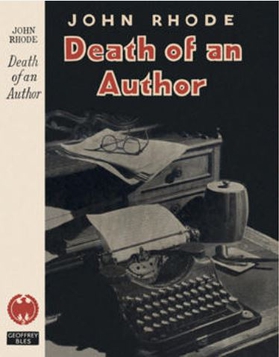
Death of an Author is a 1947 detective novel by John Rhode, the pen name of the British writer Cecil Street. It is the forty fifth in his long-running series of novels featuring Lancelot Priestley, a Golden Age armchair detective. The New Yorker described it as "Rather pleasant, in a ponderous fashion" while Will Cuppy, writing in the New York Herald Tribune, felt "Mr. Rhode provides one of those satisfying British stories in the old tradition, full of mystery meat and brain-work."

Nothing But the Truth is a 1947 detective novel by John Rhode, the pen name of the British writer Cecil Street. It is the forty forth in his long-running series of novels featuring Lancelot Priestley, a Golden Age armchair detective.
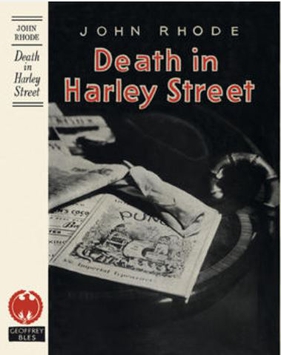
Death in Harley Street is a 1946 detective novel by John Rhode, the pen name of the British writer Cecil Street. It is the forty third in his long-running series of novels featuring Lancelot Priestley, a Golden Age armchair detective. Several sources consider it to be the author's masterpiece.

Up the Garden Path is a 1949 detective novel by John Rhode, the pen name of the British writer Cecil Street. It is the forty ninth in his long-running series of novels featuring Lancelot Priestley, a Golden Age armchair detective. It was published in America by Dodd Mead under the alternative title The Fatal Garden. Reviewing the novel in The Observer, Maurice Richardson concluded "Mr. Rhode has lost very little of his grip."

The Paper Bag is a 1948 detective novel by John Rhode, the pen name of the British writer Cecil Street. It is the forty sixth in his long-running series of novels featuring Lancelot Priestley, a Golden Age armchair detective. It was published in America by Dodd Mead under the alternative title The Links in the Chain.

The Two Graphs is a 1950 detective novel by John Rhode, the pen name of the British writer Cecil Street. It is the fiftieth in his long-running series of novels featuring Lancelot Priestley, a Golden Age armchair detective. It was published in America by Dodd Mead under the alternative title Double Identities. Writing in The Observer Maurice Richardson noted a "slight slackening of tension towards the finish but an excellent specimen of Rhode’s later period."

The Telephone Call is a 1948 detective novel by John Rhode, the pen name of the British writer Cecil Street. It is the forty seventh in his long-running series of novels featuring Lancelot Priestley, a Golden Age armchair detective. It was published in America by Dodd Mead under the alternative title Shadow of an Alibi. It is based on the real-life Wallace Case of 1931 in which William Herbert Wallace was convicted of murdering his wife Julia, a conviction which was later overturned on appeal.
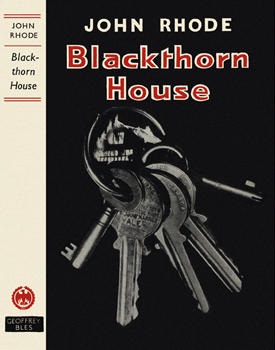
Blackthorn House is a 1949 detective novel by John Rhode, the pen name of the British writer Cecil Street. It is the forty eighth in his long-running series of novels featuring Lancelot Priestley, a Golden Age armchair detective.

Vegetable Duck is a 1944 detective novel by John Rhode, the pen name of the British writer Cecil Street. It is the fortieth in his long-running series of novels featuring Lancelot Priestley, a Golden Age armchair detective. The title refers to a dish including a Marrow stuffed with minced beef, which features in the plot. It has been described as "one of the oddest titles for a detective novel in the genre". Although written during wartime, the setting was post-war. It was published in America by Dodd Mead under the alternative title Too Many Suspects.

Night Exercise is a 1942 detective novel by John Rhode, the pen name of the British writer Cecil Street. It is a stand-alone wartime novel from Rhode, best known for his long-running series featuring Lancelot Priestley. It was published in America by Dodd Mead under the alternative title Dead of the Night.

Death Invades the Meeting is a 1944 detective novel by John Rhode, the pen name of the British writer Cecil Street. It is the thirty ninth in his long-running series of novels featuring Lancelot Priestley, a Golden Age armchair detective. Reviewing the novel for the Times Literary Supplement Maurice Willson Disher noted "His ingenuity is becoming as delicate to handle as high explosive. His stories may become so difficult to review without saying too much that his triumph will come when they cannot, for discretion’s sake, be reviewed at all."

Family Affairs is a 1950 detective novel by John Rhode, the pen name of the British writer Cecil Street. It is the fifty first in his long-running series of novels featuring Lancelot Priestley, a Golden Age armchair detective. It was published in America by Dodd Mead under the alternative title The Last Suspect. It has been described as "probably the best post-war Rhode novel".

The Lake House is a 1946 detective novel by John Rhode, the pen name of the British writer Cecil Street. It is the forty second in his long-running series of novels featuring Lancelot Priestley, a Golden Age armchair detective. It was his first novel after returning to his original publisher Geoffrey Bles after all his books between 1931 and 1945 had been published by Collins. His other series featuring Desmond Merrion continued to be released by Collins.

Proceed with Caution is a 1937 detective novel by John Rhode, the pen name of the British writer Cecil Street. It is the twenty-seventh in his long-running series of novels featuring Lancelot Priestley, a Golden Age armchair detective. It was published in the United States the same year by Dodd Mead under the alternative title Body Unidentified.
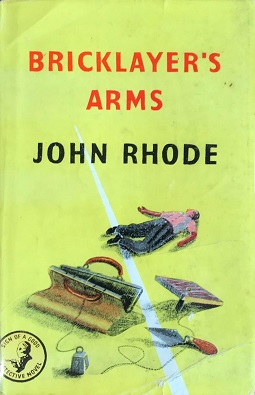
Bricklayer's Arms is a 1945 detective novel by John Rhode, the pen name of the British writer Cecil Street. It is the forty first in his long-running series of novels featuring Lancelot Priestley, a Golden Age armchair detective. It was published in America by Dodd Mead under the alternative title Shadow of a Crime. It was particularly notable for the lesser role played by Priestley, with the case being solved largely by Inspector Waghorn of Scotland Yard alone.

The Fourth Bomb is a 1942 detective novel by John Rhode, the pen name of the British writer Cecil Street. It is the thirty sixth in his long-running series of novels featuring Lancelot Priestley, a Golden Age armchair detective. In The Observer Maurice Richardson wrote "Inspector Waghorn does the investigating, but the evidence is so contradictory and suspicion so widely distributed that the solution calls for Dr. Priestley, whom, you will be sorry to hear, I thought was looking alarmingly shaky. Sound recommendation, of course" while Isaac Anderson in the New York Times wrote "It is merely the familiar Dr. Priestley formula set against the background of wartime England."

They Watched by Night is a 1941 detective novel by John Rhode, the pen name of the British writer Cecil Street. It is the thirty fifth in his long-running series of novels featuring Lancelot Priestley, a Golden Age armchair detective. It was published in the United States by Dodd Mead with the alternative title Signal for Death.



















